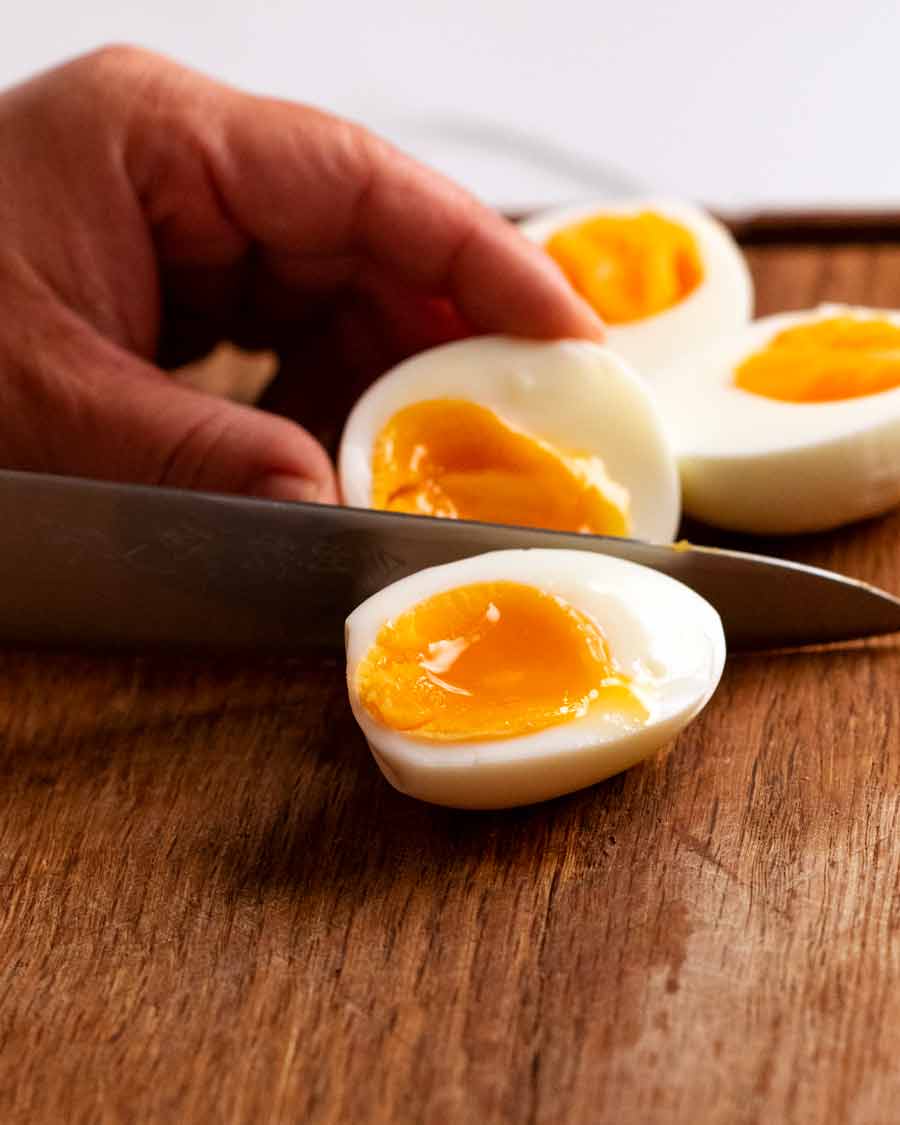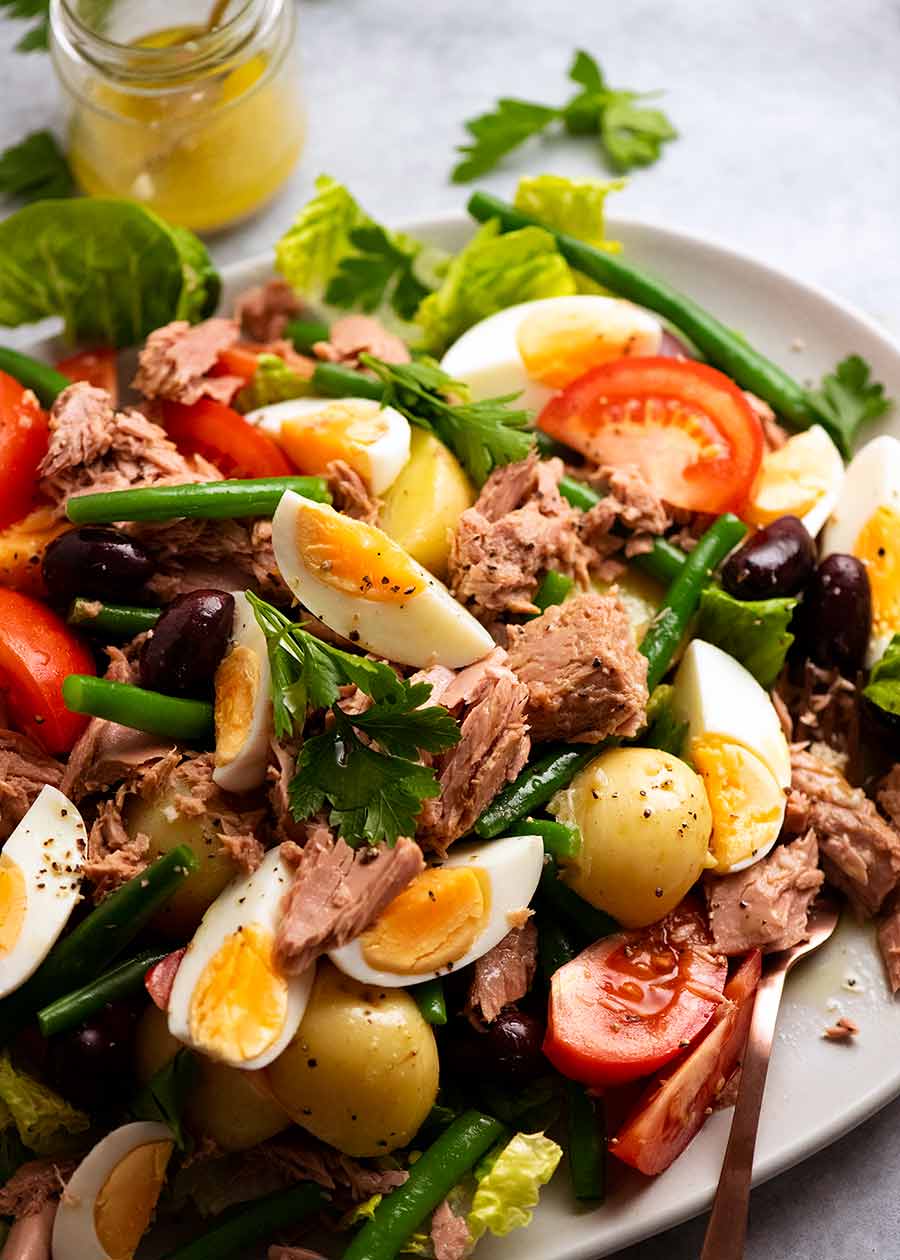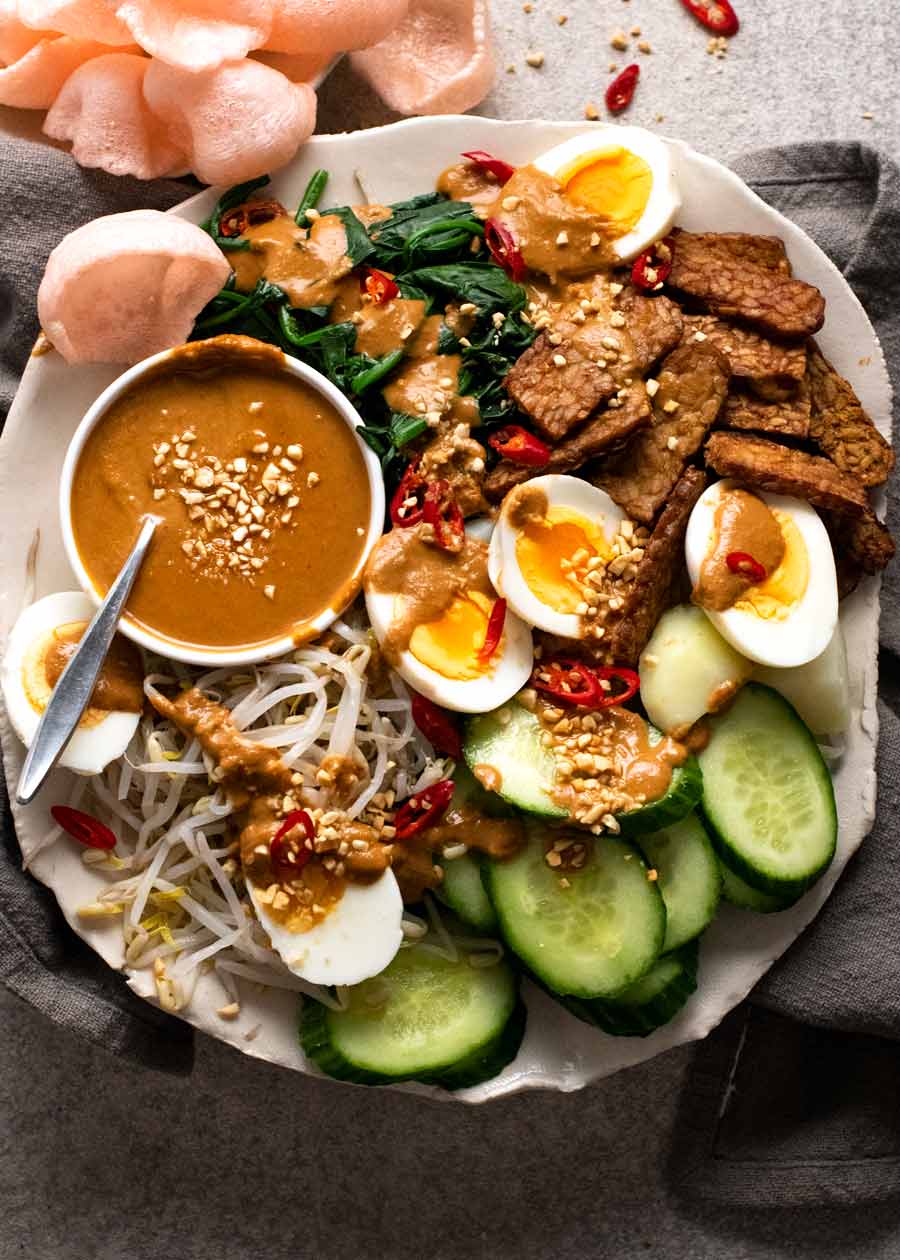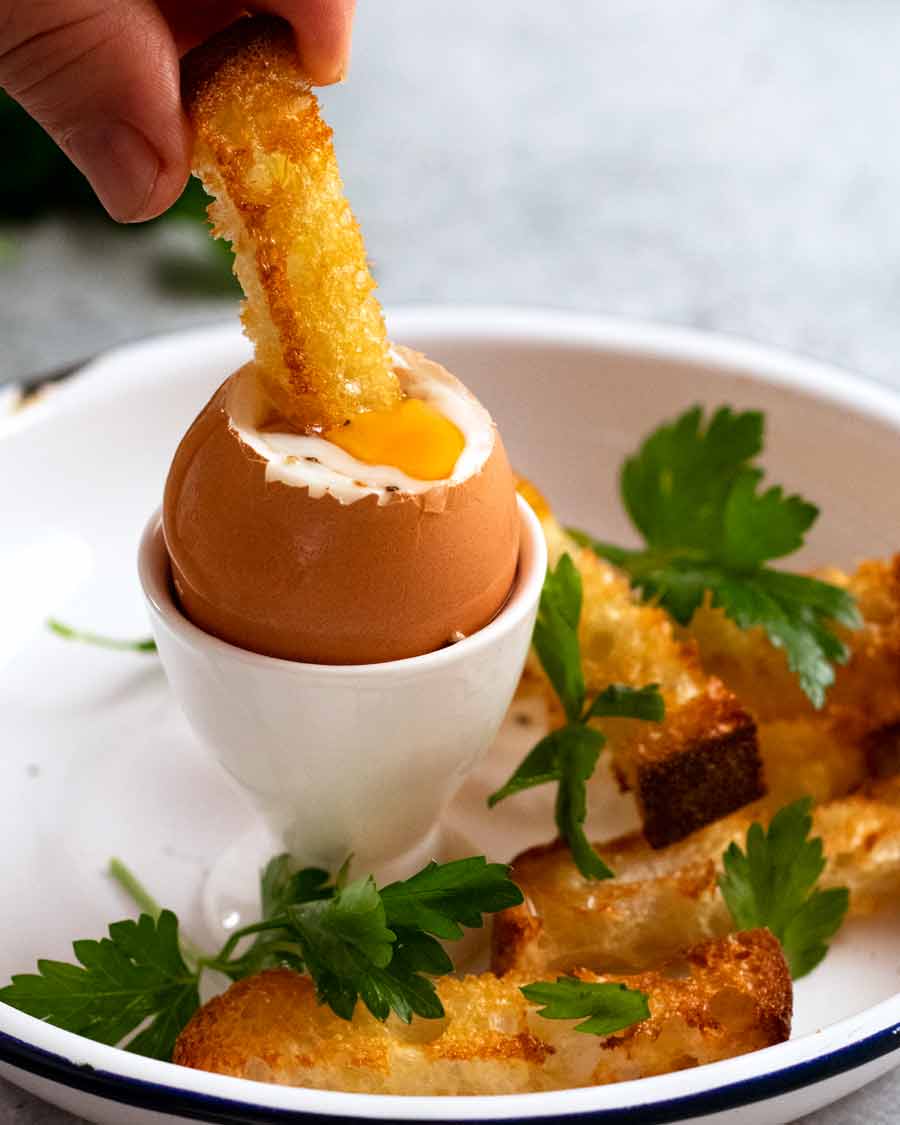Unveiling the Secrets of Hard-Boiling Eggs
Hard-boiled eggs, a culinary staple, are a versatile ingredient that can elevate a wide range of dishes. Mastering the art of hard-boiling eggs is essential for any home cook, ensuring perfectly cooked eggs with ease.
The Boiling Process: A Step-by-Step Guide
-
Submerge Eggs in Water: Gently place the eggs in a single layer at the bottom of a saucepan or pot. Fill the pot with cold water, ensuring the eggs are completely submerged.
-
Bring to a Rolling Boil: Place the pot over high heat and bring the water to a rolling boil. This vigorous boiling helps prevent the eggs from cracking.
-
Turn Off Heat and Cover: Once the water reaches a rolling boil, immediately turn off the heat and cover the pot with a lid. This step is crucial for achieving perfectly cooked eggs.
-
Steaming Time: Allow the eggs to remain in the hot water, covered, for the following durations:
- Soft-boiled: 3 minutes
- Medium-boiled: 6 minutes
- Hard-boiled: 12 minutes
-
Transfer to Cold Water: After the desired cooking time, immediately transfer the eggs to a bowl of cold water to stop the cooking process and prevent overcooking.
The Science Behind Turning Off the Heat
Turning off the heat after bringing the water to a boil is a critical step in hard-boiling eggs. This technique serves several important purposes:
-
Prevents Overcooking: Leaving the eggs in boiling water for an extended period can result in overcooked yolks and rubbery whites. Turning off the heat allows the eggs to continue cooking gently in the residual heat, ensuring a tender and evenly cooked egg.
-
Minimizes Green Yolks: Boiling eggs for too long can cause the yolks to develop a greenish-gray ring around the edges. This discoloration is caused by a chemical reaction between the sulfur in the egg white and the iron in the yolk. Turning off the heat helps prevent this reaction and results in bright yellow yolks.
-
Easier Peeling: Overcooked eggs are more difficult to peel, as the shell adheres more tightly to the egg white. Turning off the heat allows the eggs to cool slightly before peeling, making the process easier and reducing the risk of tearing the egg white.
Tips for Perfect Hard-Boiled Eggs
-
Use Older Eggs: Older eggs have a thinner shell, making them easier to peel.
-
Add Salt to Water: Adding a teaspoon of salt to the water helps prevent the eggs from cracking during boiling.
-
Use a Slotted Spoon: When transferring the eggs to cold water, use a slotted spoon to avoid any eggshell fragments from sticking to the eggs.
-
Peel Under Running Water: Peeling the eggs under running water helps loosen the shell and makes the process even easier.
-
Store Properly: Hard-boiled eggs can be stored in the refrigerator for up to 7 days. Place them in a covered container to prevent them from absorbing odors.
How to boil eggs
No matter what kind of pot you use or how powerful your stove is, this method will consistently yield the doneness you desire.
- Boil water first.
- Gently lower in fridge-cold eggs.
- Reduce the heat just enough to keep the water at a gentle boil without breaking the eggs from being beaten around.
- Set a timer for six minutes for runny yolks, eight for soft boiled yolks, ten for traditional hard boiled yolks, and fifteen for rubbery whites and powdery dry yolks.
- Transfer into a large bowl or sink of cold water.
- Peel under water starting from the base (it’s easier).
And that’s all you need to know. But if you’re wondering about the why, read on!.
My egg boiling rules & the why
- Before adding eggs, bring the water to a boil. Your pot and stove are superior to mine, so your water boils more quickly. Our egg cook times will therefore differ if we both start with cold eggs in cold water and then bring it to a boil. Additionally, who wants to stand over a pot and wait for it to reach a specific boiling point at which point to start a timer? Eliminate that variable by always starting your eggs in boiling water. What temperature do you actually consider the water to be at?
- Reduce the heat a little after adding the eggs so they don’t crack from being beaten around. However, maintain the water at a quick simmer or gentle boil to avoid losing heat. Goal: maximum water bubbling without eggs cracking.
- Eggs that are refrigerated provide a guarantee for smooth or runny yolks and are consistently easier to peel. It is important that everyone boil eggs to the same temperature. An egg boiled at room temperature takes 8 minutes; an egg cold from the refrigerator takes 5 minutes!
- Egg size: The cook times mentioned above apply to “large eggs,” which are packaged and sold in designated cartons. “Large eggs” are defined by industry regulations as being between 50 and 55g / 2 oz each. For other egg sizes:– Extra-large eggs (60g/2. 2 oz): add 30 seconds – Jumbo eggs (65g /2. 5 oz): add an additional minute; an emu egg recipe will be posted soon. (maybe! ).
- Avoid packing the pan too full of eggs in a small saucepan. This will result in less heat reaching each egg and a longer cooking time.
- Pan size: A 16cm/6′′ pan can hold 4 eggs, while an 18cm/7′′ saucepan can hold 6 eggs.
- Because ice is so valuable in these parts, save it for cocktails. You can stop the cooking process with a bowl of cold tap water, so there’s no need to waste them on your morning eggs!
- Peel from the base – It’s easier. Try it.
- Peel under water – Also easier. Try it!




How To Cook Perfect Hard-Boiled Eggs
FAQ
Should I lower heat when boiling eggs?
Do you boil eggs at high or low heat?
How hot should water be for boiling eggs?
Do you cool down hard boiled eggs?
How long do you boil hard boiled eggs?
Bring the water to a boil, then remove the pot from the heat. Let the eggs sit in the hot water for 10 minutes for hard-boiled eggs or 6 minutes for soft-boiled eggs. Remove the eggs from the pot and plunge them into an ice bath or run them under cold water. Then, crack them against the counter and peel them with your fingers.
How to cook hard boiled eggs?
If you follow these simple steps, you’ll achieve perfect hard boiled eggs every time: STEP 1 – Choose a pot that is deeper than the eggs. Place the eggs in the pot and cover completely with cold water. The water should be approximately one inch over the tops of the eggs. STEP 2 – Bring the uncovered pot to a full boil.
How long do you boil eggs in a frying pan?
Bring to a rolling boil over high heat, then remove the pan from the heat, cover, and let stand for 10 minutes. Carefully pour out the hot water; place the pan in the sink and run cold water over the eggs until the pan is lukewarm, 1 to 2 minutes. Drain and refill with cold water; let stand until the eggs are room temperature, about 10 minutes.
How long do you keep hard boiled eggs in water?
Keep the eggs in the water for up to 15 minutes for creamy hard-boiled eggs for deviled eggs and cobb salads. Every minute counts when hard-boiling eggs to a specific degree of doneness. Evacuate eggs from hot water when the timer rings, but they will continue to cook unless you take steps to cook the eggs quickly.
